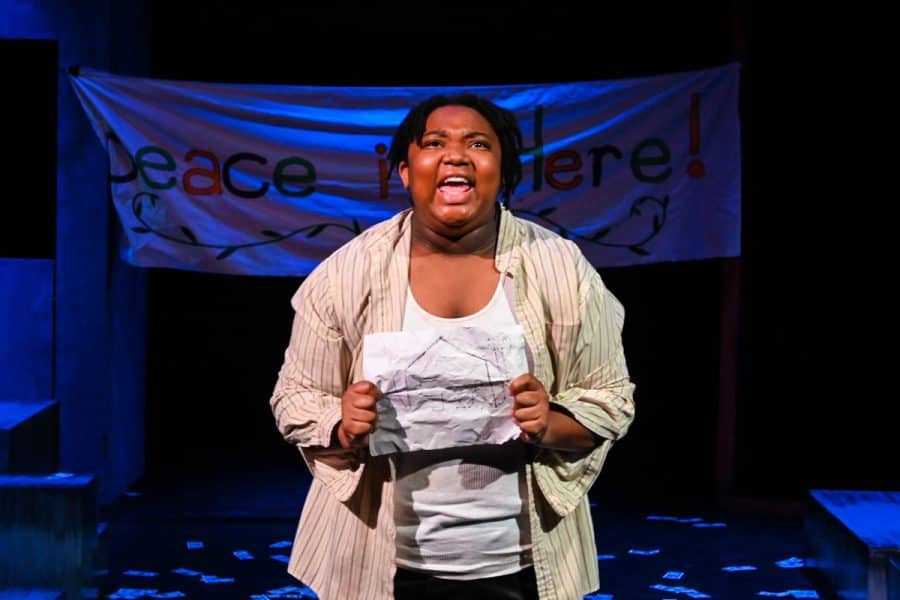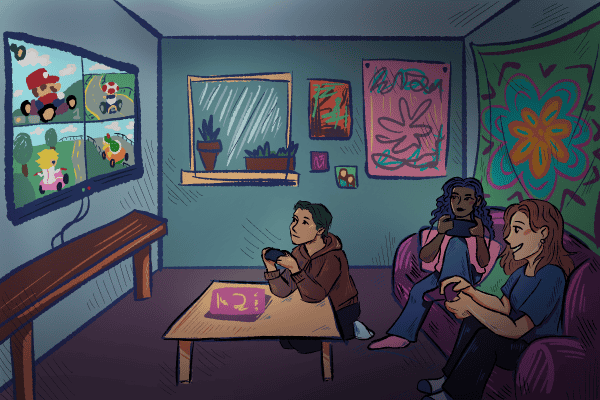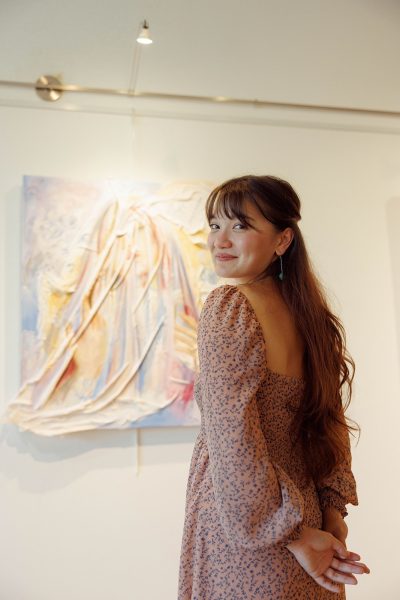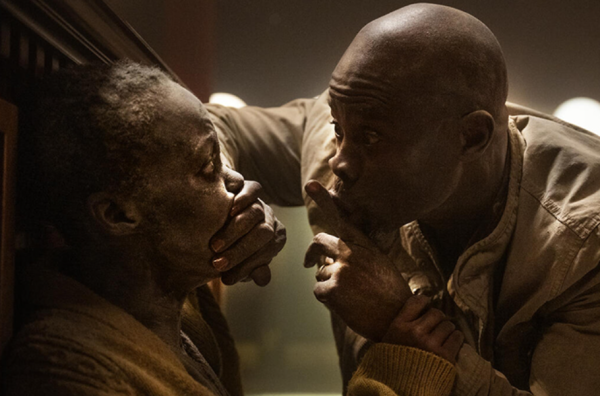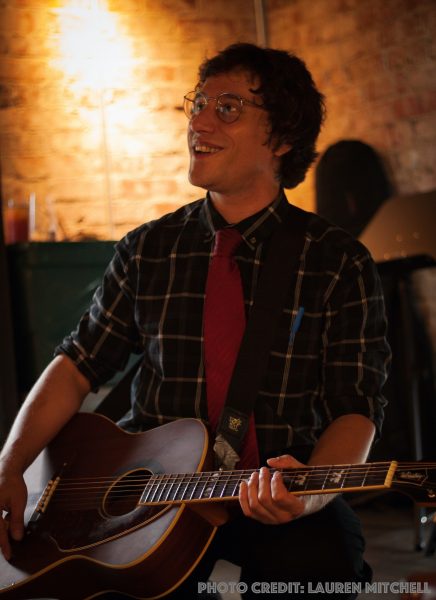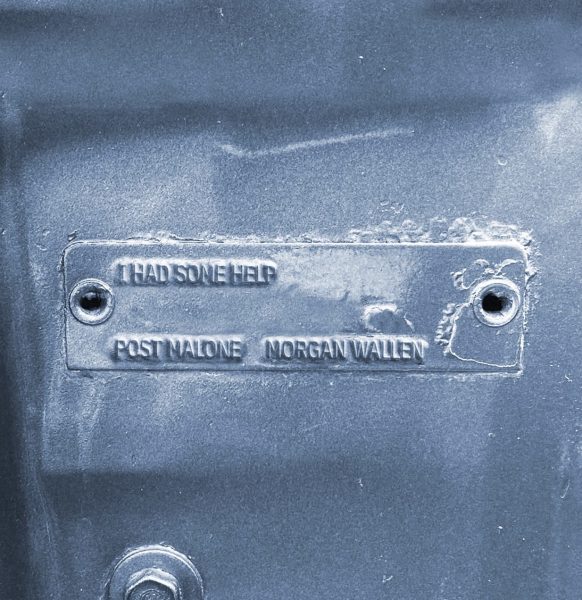Review: “Frontières Sans Frontières” appears on the stage of the Allen Bales Theatre
March 29, 2023
Appearing at the Allen Bales Theatre, The University of Alabama Theatre and Dance Department will be producing “Frontières Sans Frontières” through Sunday, April 2.
In the span of two hours, the play is an allegory to and an exploration of the impacts of neo-colonialism and cultural imperialism, particularly focusing on the “charity” rich western countries give to their developing counterparts.
The play is directed by Robert Huson, a second year MFA candidate who worked with the cast and crew to create the fourth production of this show since its creation in 2017 by Phillip Howe, who is now a lecturing professor at Harvard University.
The play’s uniqueness comes from its use of theatric techniques and stylistic choices. The story is unfolded in the commedia style of theater, an art form that makes full use of humor to engage audiences. The show is filled with characters performing physical humor with their bodies, cartoonish sound effects, and plenty of jokes surrounding certain events that occur as the storyline progresses.
Another technique the show employs is directly referencing the whole audience in small moments during the play. It is not interactive theater, but the characters in the show point and make eye contact with audience members. There are times when the lights come on, not to indicate that the show is over, but to reveal the audience as if they are a part of the show itself. The show even encourages the audience to participate in singing a song.
Lastly, and most unusually, the actors in the play break character and even sit with the audience to step outside of the show. They completely drop their fictional accents and character behaviors to reveal a hidden thought that is behind the actor’s mind, making them appear to be over whatever nonsensicalness that is happening on stage.
Huson said that in this play they are “embracing a school of theater thought around virtual practice. Having moments where actors drop character and just engage as simple actors in the moment.”
The setting of “Frontières Sans Frontières” is in a fictional place called “He’re,” a place that is meant to represent countries in the Global South, which is considered to be made up of economically disadvantaged countries, particularly those negatively affected by global capitalism.
News broadcasts of current events in the play paint a picture of a country surrounded by war and soon to be involved in war itself. The stage is littered with trash, which serves as the home to the three protagonists, Win, Noon and Pan, and is a hotbed for tourists, non-profit organizations, social media influencers and foreign investors, all hailing from wealthier countries.
Despite He’re being a foreign nation introduced to the audience, the natives of the country speak broken “Ingaleash,” a parody of English, instead of their native tongue. Foreigners, for some time, have already come to the land of He’re, so the protagonists of the story speak and learn Ingaleash to better navigate their life of poverty, begging and entertaining tourists to procure money or food for themselves.
As the play progresses more and more, foreigners invade the homes of the three natives and their local tea shop, offering to help and provide charity that ultimately transforms He’re into a place that is unrecognizable by its peoples due to foreign aid and investments from non-profit organizations like the World Health Organization and its fellow pharmaceuticals cooperatives. With all of this, the social media influencer character is only vaguely interested in her humanitarian mission as long as she is able to make capital gain.
The setting is only one example of the amount of nuance the play adds to the discussion of Western charity in developing countries. The show does an excellent job of covering the many layers and some of the intersections that connect the processes of neo-colonialism and cultural imperialism.
The impoverished protagonists learning to speak Ingaleash, but by forgetting their native tongue by the end of the show, it becomes an example of cultural erasure through the medium of language, which provides the characters with a certain agency that their native tongue could not in their daily lives.
All the foreign characters that come to He’re serve as devices to the spread of Western pop culture, which alludes to the idea of cultural domination when acknowledging the capitalistic value system we apply to culture, land and even human lives.
Charity in this play is clearly not philanthropic, but a system that ruins lives or indentures native “He’re-ians” because of the shadowed motivations of people and organizations looking to change the developing country into a reflection of their own.
When the foreigners clean He’re to make it more aesthetic, life becomes cyclical and the affluent begin to act robotic as they move from one aspect of their lives to another repeatedly, uninterrupted. And as the play progresses, tensions brew between the three protagonists as capitalistic interests replaces the familial bond that held them together. In this way, the play covers another major theme: Connections, not backed up behind personal interests, are lost when cultural priorities shift.
When they begin to value economic gain over the wellbeing of one another, they fight and eventually the group separates, placing each member on an entirely different path. The only thing that connects them now is that they are victims in the hypothetical cultural genocide.
As the play comes to a decisive end — Win is left behind in a soon-to-be war-torn country, while Noon and Pan move on to become models of Western prosperity — the audience is left in the darkness to ask what role they played in the happenings of the show and how clearly paralleled it is to the real world.
“I am really excited to see how the show develops when we have a full audience,” Huson said. “Because of the role of the audience in the conversation piece, there’s going to be elements that fundamentally change when more people are in the room.”
“Frontières Sans Frontières” manages to be both funny and thought-provoking, encouraging critical thinking between laughs of delight.
For more information on upcoming UA Theatre and Dance shows, visit the department’s website. Tickets for “Frontières Sans Frontières” can be found here for $15 for adults and $10 for students.

